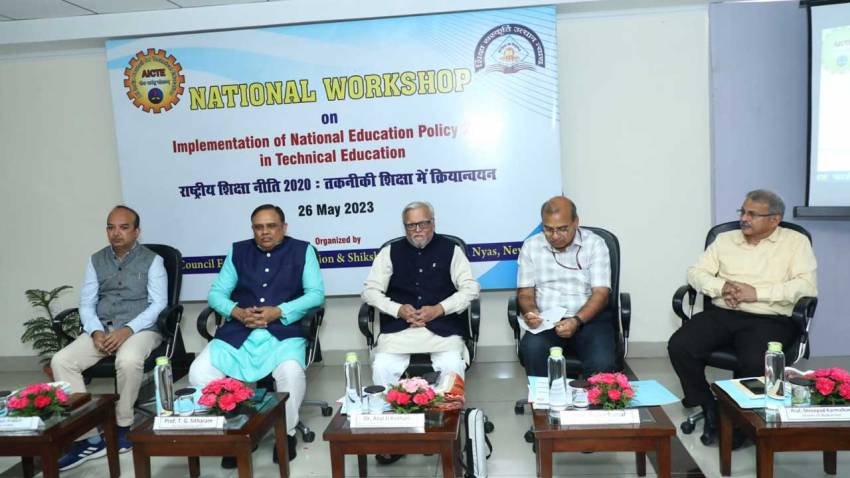AICTE and Shiksha Sanskriti Uthan Nyas successfully organize National Workshop on the Implementation of National Education Policy 2020 in Technical Education

New Delhi : The All India Council for Technical Education (AICTE) and Shiksha Sanskriti Uthan Nyas (SSUN) successfully organized a Joint Workshop on the 'Implementation of National Education Policy 2020 in Technical Education' at AICTE Headquarters in New Delhi. The workshop aimed to foster collaboration, share best practices, and discuss the way forward with respect to the National Education Policy (NEP) 2020.
The inaugural session of the workshop commenced with the lighting of the lamp, representing the pursuit of knowledge and the elimination of darkness. Esteemed Heads of Institutions from prestigious technical institutions, including IITs, NITs, IISERs, Technical Universities, and renowned technical institutions, graced the occasion with their presence.
Prof. Rajive Kumar, Member Secretary, AICTE, in his welcome address outlined the main features of NEP-2020 and the purpose of holding the brainstorming workshop to take stock of the implementation strategies adopted by leading technical institutions and give their valuable suggestions in taking forward this mission.
Prof. T G Sitharam, Chairman, AICTE, in his keynote address highlighted the reforms AICTE has brought out in its regulation & approval mechanism to meet the expectations of stakeholders. He talked about AICTE's e-Governance model to achieve accountability, integrity, credibility, transparency, and efficiency in institutional governance to provide effective services to all its stakeholders. He said, "As implementation stands out as a key aspect in determining the success of this policy, owing to the involvement of multiple stakeholders, the need was felt to relook at multiple entry/exit provisions made in UG & PG Programs, a multi-disciplinary approach by providing elective courses, adoption of NCrF and NHEQF, integration of vocational education with mainstream education, revamping of model curriculum to align with NEP-2020 and appealed to the academic fraternity to chalk out a comprehensive implementation framework so that institutions can achieve the aspirational goals of 21st-century education as envisaged in NEP-2020."
The official website of the Indian Society of Technical University was launched, providing a platform for technical universities across the country to collaborate, share best practices, and foster innovation. Additionally, 13 Memoranda of Understanding (MoUs) in offline mode and 04 MoUs in online mode were signed between AICTE and various IITs, NITs, and IISERs for the J&K Internship program, creating internship opportunities for students from Jammu and Kashmir in prestigious technical institutions.
The workshop also featured two panel discussions, chaired by Prof. Laxmidhar Behera, Director of IIT Mandi, and Prof. Shreepad Karmalkar, Director of IIT Bhubaneswar. These discussions shed light on the best practices of implementing NEP 2020, emphasizing personalized education, holistic development, skill enhancement, and industry-academia collaboration as key factors for success.
Speaking on the occasion, Dr. Abhay Jere, Vice Chairman of AICTE, said, "Nurturing an innovation ecosystem in academic institutions provides valuable insights into fostering a culture of innovation, entrepreneurship, and a start-up ecosystem within technical institutions."
The valedictory function of the workshop witnessed the presentation of a comprehensive report by Prof. Ganesan Kannabiran, Director of IIIT Sricity, summarizing the key highlights and outcomes of the conference. Participants engaged in thoughtful discussions on the way forward for implementing NEP 2020 in technical education, highlighting collaboration, skill development, multidisciplinary approaches, and holistic education as essential elements for an Atmanirbhar Bharat.
Dr. Atul Kothari, National Secretary of Shiksha Sanskriti Utthan Nyas, emphasized the need for a comprehensive and holistic approach to education, including teaching in Indian and regional languages. He commended the efforts of AICTE in developing language translating software and underscored the importance of collaboration between institutions and NGOs to enhance the education system.
Dr. Mamta R. Agarwal, Advisor-I of AICTE, expressed gratitude to all the attendees, speakers, and organizers for their valuable contributions and participation. The success of the workshop was attributed to the dedication and commitment of all involved, setting the stage for further progress in the implementation of NEP 2020.
The National Workshop on the "Implementation of National Education Policy 2020 in Technical Education" served as an invaluable platform for sharing best practices, fostering collaboration, and charting the way forward. The leaders in the field of technical education shared their valuable insights, experiences, and best practices related to the implementation of NEP 2020, contributing to a comprehensive understanding of the policy's implications.








